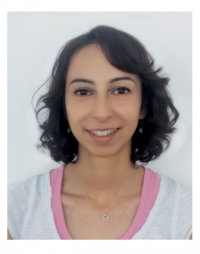
October 2021
This month's voice:
Kirsten Razzaq, "Collaboration in the Classroom"
Introduction
Lindsay Herron
Editor, KOTESOL Voices
For the past several months, I've had the pleasure of working with the positive, upbeat dynamo Kirsten Razzaq on Reel to Real: 2021 Film-Making Festival and KOTESOL National Conference. Involved as she is at both the chapter and national level, I was very curious about her thoughts and perspectives, and I was delighted when she agreed to contribute a piece to this issue of KOTESOL Voices!
Kirsten's reflections on crafting a collaborative co-teaching relationship really resonated with me; though it's been years since I've had an official co-teacher (and mine never actually joined me in the classroom), I feel her insights are applicable beyond the boundaries of the classroom, as well. I'm sure Kirsten's words will be inspiring to anyone striving to create positive relationships and constructive connections--whether in schools or in the wider world. Happy reading!
Collaboration in the Classroom
Kirsten Razzaq
A major part of my job is collaboration. I work in the public school system as a native English teacher, and I currently teach alongside four colleagues at two different schools. I co-teach elementary grades 3 through 6, and my situation changes every 12 months. From year to year, I don’t know whom I will be working with. During the last four years living in Busan, I have taught alongside eight different co-workers with varied experiences both inside and outside of the classroom. I have come to realize that a healthy collaborative relationship relies on three things: trust, respect, and clear boundaries.
Coming from a creative design background, I have long been used to working closely with others to achieve a common goal, often burning the midnight oil. I will admit that I didn’t consider the importance of teamwork when I walked into my first elementary school class in 2017 with one aim: to teach English. It didn't occur to me that the co-teaching relationship was something I could nurture, I was so focused on improving the pedagogical skills required for teaching my mother tongue.
As I gained experience, I found I was dissatisfied with my work life. I worried about what other English teachers thought of our classes. It was rare to receive any personal feedback, even when we spent time reflecting on the materials and lesson procedures. We rarely focused on or praised each other. During the shift to online teaching in mid-2020, my workload appeared to increase exponentially. I struggled to churn out pre-recorded lesson videos while adapting materials for both synchronous and asynchronous online classes. There wasn’t a week where I wasn’t exhausted. It didn’t help that contact with my colleagues became reduced to teaching time only, as we lost the social aspects of school life altogether and retreated into our respective offices, socially distancing ourselves.
In February 2021, I met Gizem Genc and Antonina Nemtinova at the Korea TESOL International Conference, where we joined the Graduate Student Showcase. There was something about these educators that made me curious to learn more about their collaborative relationship. The research project they presented was completed as part of their second-language acquisition course, and it focused on Turkish EFL learners’ cultural identities and how this affects learners’ theme preferences used in the classroom. This was part of their ELT MA program at Bahçeşehir University, Turkey. I was immediately struck by their synergy. They were clearly a close team. So I got in touch with them to find out more.
Here are some excerpts from our interview in March 2021:
Were there any issues that arose while collaborating, and how did you solve them?
Gizem: It was our first semester, so it was difficult to adjust ourselves to the intensity of the course while working full-time. Antonina is the one who sacrificed a lot, I lost the count of the times I trespassed on her family time.
Our schedules were hectic as hell! During the weekdays, we were teaching from 9:00 to 17:00, and between 19:00 to 21:50 we had synchronous (online) sessions, many times after our courses we crammed for hours on end, not to mention weekends and individual tasks.
Why did you decide to collaborate together?
Antonina: The other reason for us to click was that we are both responsible yet sensible people. The biggest challenge of group work is to trust your partner, and usually unconditionally. You go in blindfolded, especially during these online times. You get to see the person in front of you in a very limited context and have to use a sixth sense to understand them. We both care about our studies, and as it turned out we were ready to give it our best. We got lucky finding each other.
Gizem and Antonina were fortunate enough to meet through their course and chose to work together, but their experiences highlighted some important insights for me. It’s not so much the abilities of the teachers I have worked with—their teaching skills, English language skills, classroom management skills, or personal and professional experiences. What matters most as a co-teacher, or in any team, is how we negotiate our space with each other. How we build a mutual sense of trust, respect, and understanding of each other’s boundaries. It is the personal interactions while planning, the moments grabbed during break times to discuss weekend plans or lack thereof, and the experience of getting through a tough semester or year together that can enable us to form powerful collaborative relationships.
I realized Gizem and Antonina understood each other’s personal lives and needs, as well as being aligned in their project and academic goals. They talked about how they knew they could rely on each other to complete assigned tasks and also understood each other’s strengths and weaknesses. Having this knowledge about each other led to those three magic ingredients I mentioned earlier: trust; respect; and clear, intentional boundaries.
Although this is probably not news to any of us, this realization for myself was profound. I had been introspective, continuously working on my teaching skills and personal development, but I hadn’t recognized the value of simply socializing with my colleagues. With a new semester has come a new opportunity to nurture workplace relationships. With some teachers this has come naturally, and we just “click.” We are aligned in our expectations and goals for each class we co-teach. With others, let’s just say it’s still a work in progress. Each teacher is unique and so is our relationship, and accepting this has made co-teaching more enjoyable these last few months.
Retrospectively, if there were advice I could give to my past self, it would be this: be more curious about my co-workers; accept them as they are; and try to avoid making comparisons between relationships, however challenging they may be. Navigating cultural differences and discovering common ground can take time, patience, and determination, but ultimately help to lay the foundations for strong collaborative relationships.
I would like to thank Gizem and Antonina for taking time earlier this year to talk about their graduate student experiences and collaborative research project.
About the interviewees:
Gizem Genc is an EFL teacher specialising in general English and IELTS and who works with teens and adults in Istanbul, Turkey. She has a BA in ELT and has completed the DELTA Module 1 and 3. Her interests include TBLT, dogme ELT, spoken discourse, using technology, and teacher training.
Antonina Nemtinova is an EFL teacher at Istanbul Gedik University, Turkey. She graduated from Taurida National V.I. Vernadsky University in Ukraine with a BA and MA in Persian language and literature.
About the Author
 Kirsten Razzaq currently teaches English to young learners in Busan, South Korea, where she has lived since 2017. She recently completed an MA TESOL from the University of Sunderland, and her thesis focused on mobile-assisted language learning outside the classroom. Since 2019 Kirsten has lectured online and offline for the NIIED, training incoming EPIK teachers and TaLK scholars. She is the KOTESOL Busan-Gyeongnam Chapter secretary for 2021, and she hopes to connect members with opportunities for personal and professional development.
Kirsten Razzaq currently teaches English to young learners in Busan, South Korea, where she has lived since 2017. She recently completed an MA TESOL from the University of Sunderland, and her thesis focused on mobile-assisted language learning outside the classroom. Since 2019 Kirsten has lectured online and offline for the NIIED, training incoming EPIK teachers and TaLK scholars. She is the KOTESOL Busan-Gyeongnam Chapter secretary for 2021, and she hopes to connect members with opportunities for personal and professional development.


